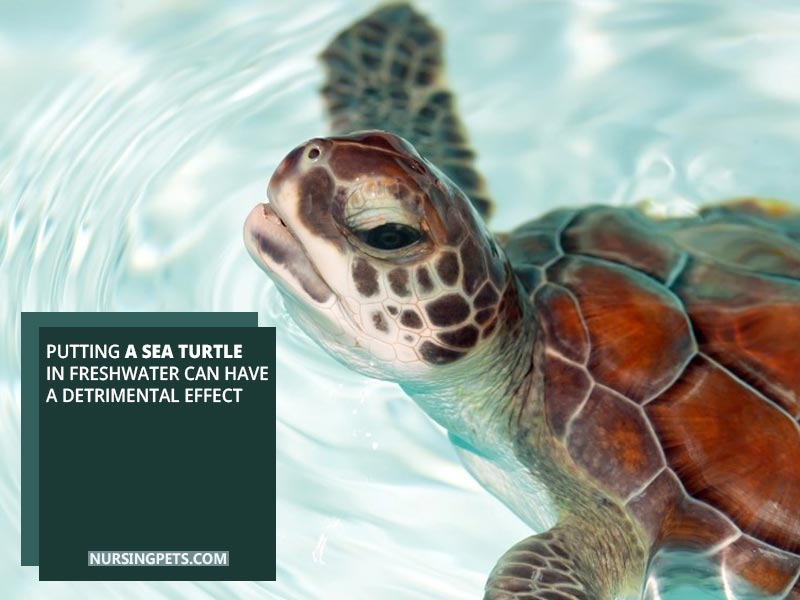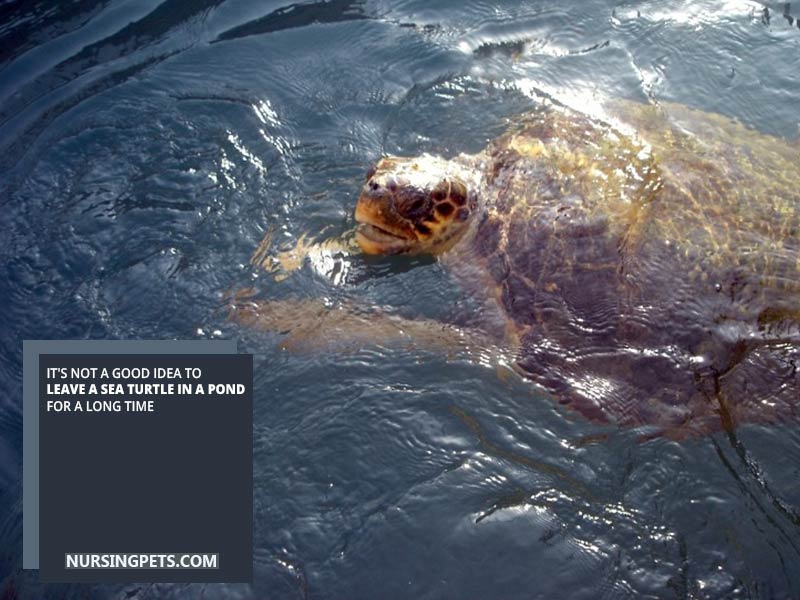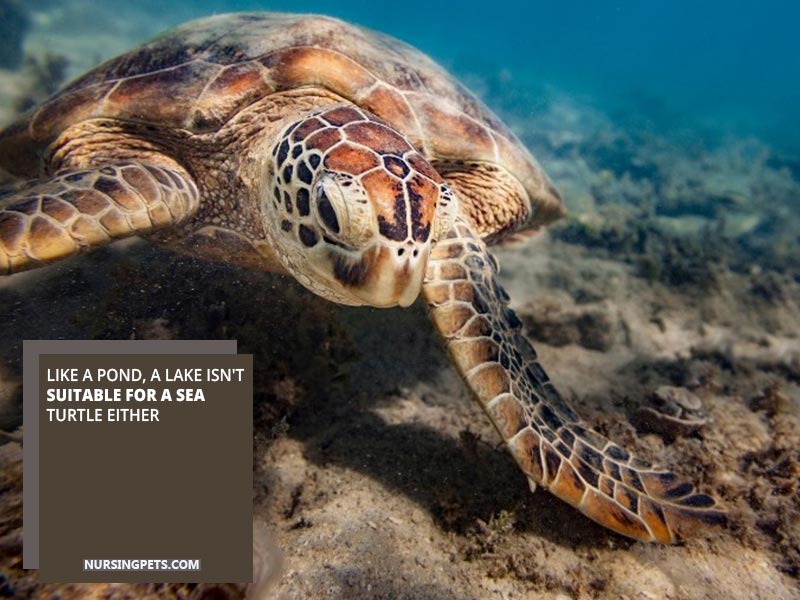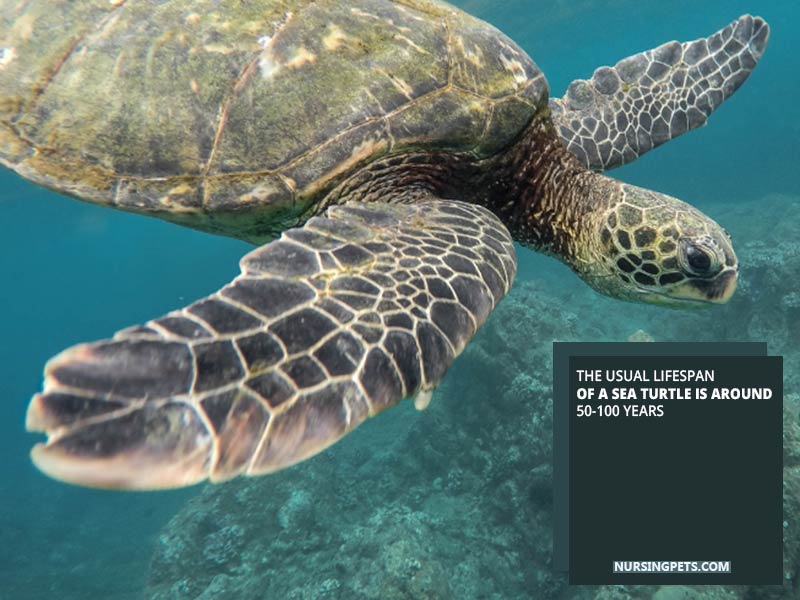Can Sea Turtles Live In Freshwater?
For sea turtles, the ocean is like their home, and it provides them with everything they need. The water temperature, salinity, and other chemical and physical properties must all be within their tolerance range in order for them to survive.
However, an interesting question is often asked: Can sea turtles live in freshwater? No, sea turtles can’t reside in freshwater for an extended duration. These reptiles are adapted to live in marine environments and won’t survive for a long time in freshwater.
That said, what would happen if you put these turtle species in freshwater? And do they always live in saltwater? We have answered all these questions and many more in this content. Let’s read.
Read more about turtles blog:
Can You Keep Sea Turtles in Freshwater?
Theoretically, sea turtles can’t survive in freshwater; but you can keep them in fresh water for a while. Some petters have kept these species in freshwater for a few weeks to help them facilitate rehydration.

After the mentioned time passed, those pet owners moved sea turtles into salt water to help turtles thrive. You can also do the same, but we don’t recommend permanently keeping sea turtles in freshwater.
If you do, your turtles will face challenging situations and may not live for an extended duration. Read the following section to learn more about what can happen if you permanently keep sea turtles in freshwater.
“We have covered an in-depth article on sea turtles; if interested, you can read our full article here.”
What Would Happen If You Put A Sea Turtle In Fresh Water?
Freshwater has very different chemical and physical properties than the ocean and is not suitable for the needs of sea turtles.
However, putting them in freshwater can have both short and long-term effects on their health and well-being.

Though freshwater won’t kill a sea turtle immediately, in the short term, the sea turtle will become incredibly stressed and disoriented and will experience osmotic shock, which is the sudden change in the concentration of minerals within the body.
So, it may try to swim away. However, their body will attempt to counterbalance this shock by attempting to pull salt out of the body, causing dehydration as a result. And dehydration will make sea turtles lethargic and can cause serious health issues or even death.
Moreover, the sea turtle’s lungs will also be affected by the sudden change in environmental conditions. The freshwater causes the lungs to become wetter and more congested, leading to difficulty breathing and an increased risk of infection.

In the long term, the freshwater environment can seriously damage the sea turtle’s physiology. When exposed to freshwater, sea turtles’ bodies cannot properly balance their electrolyte levels, leading to potential dehydration and organ failure.
Additionally, sea turtles cannot properly absorb vitamins and minerals in freshwater, leading to a weakened immune system and potential infection.
Therefore, we don’t recommend keeping a sea turtle in fresh water for a prolonged period, such as over six months, without monitoring blood parameters, adjusting diet, or offering supplements.
Do Sea Turtles Need Saltwater?
Indeed, sea turtles need saltwater to survive and thrive as these reptiles drink saltwater to live. They boast sea glands which they utilize to separate salt from the water and drink it.

Alongside that, these reptiles rely on marine ecosystems for food and help maintain the coral reefs and seagrass beds. So, in a nutshell, an aquatic environment is crucial for a sea turtle to live.
Can A Sea Turtle Live In A Pond?
Although aquatic and semi-aquatic turtles reside in various water bodies, including streams, marshes, swamps, and ponds, whether sea turtles can live in a pond or not is still a mystery.

No research has been conducted yet on this matter. But researchers believe as sea turtles can live in freshwater for some time, they can probably live in a pond but not for a prolonged period. They are the turtles of the ocean, and they belong there.
However, if you can provide an adequate environment and the necessary conditions suitable for sea turtles, they can survive there. But that’s not a good idea.
Can a Sea Turtle Live in an Aquarium?
They may live in an aquarium for a certain period. But, as you know, sea turtles can’t survive in freshwater for long. They are entirely different animal groups with adverse physical characteristics that can only adapt to aquatic environments.
Life at sea and in freshwater, especially in a turtle tank, isn’t the same for these reptiles. Hence, if you put a sea turtle in an aquarium, it will suffer a lot and will eventually die without saltwater.
Also, you can’t find a large number of sea turtles in captivity. And people who keep them are professionals and provide extreme care. Actually, those are for research purposes or injured ones.
Can Sea Turtles Survive in Cold Water?
It depends on how cold the water is. If the water temperature falls below 50 degrees Fahrenheit, sea turtles will face hurdles and may not survive. FYI, sea turtles are susceptible to cold stunning.

Sea turtles become lethargic when the water temperature drops, and their blood circulation and other body functions slow down. Consequently, they become cold-stunned and vulnerable to predators.
Besides, cold-stunned sea turtles are more prone to fall sick and can even die if they remain in such an intolerable condition for a long time.
Do Sea Turtles Live in Deep or Shallow Water?
Most adult sea turtles reside in shallow coastal waters, lagoons, estuaries, and bays. And some juveniles live in bays, seas, and estuaries. But a few of them venture into the open ocean.

Now, let’s disclose “how deep in the ocean do sea turtles live?” Although they can’t breathe underwater, they can hold their breath for an extended duration, enabling these reptiles to dive deep into the ocean.
Usually, most sea turtles can dive to depths of up to 290 m, but some of their species can dive even deeper for food. For instance, the leatherback turtle can dive up to 1000 m, and the deepest dive record of a leatherback turtle is around 1200 m.
Can a Sea Turtle Survive in a Lake?
As you know, sea turtles are aquatic creatures; they only adapt to marine environments. Therefore, these turtle species can scarcely survive in any other habitats.

And this statement remains the same for the lake environment. If you keep sea turtles in lakes for a long time, they won’t survive. The water body is different, and these reptiles can’t find the food required to stay alive.
Can Sea Turtles Live Only in the Water?
Sea turtles live primarily underwater but leave the ocean and come onto the land to lay eggs. Besides, sea turtles step on rocks or grounds when basking.

So, considering these activities, we can say that sea turtles don’t only live in the water but also come out of water bodies for a short period.
That said, if you are searching for an in-depth article on “can sea turtles survive out of water?” click here.
Can Sea Turtles Live on Land?
Sea turtles can live on land for a little while, but they can’t spend a considerable amount of time on land like land turtles. So, why can’t sea turtles live on land?
It’s because sea turtles are ectotherms. They need water to regulate their body temperature and prevent dehydration. Again, they need air to breathe and a water-less surface to lay eggs.
That’s why sea turtles live mostly underwater and come out of the water’s surface to breathe, and they leave water bodies to bask and populate but can’t permanently live on land.
How Long Do Sea Turtles Live?
Sea turtles live between 30 and 50 years, but some were documented to live up to 150 years. So, if you wanted to know the answer to the question, “can sea turtles live for 150 years?” you get it now.

But have you ever wondered if turtles can live more than 150 years? For example, can sea turtles live 1000 years? No, sea turtles can’t live for that long period. Although some lucky animals can live more than 500 years, turtles don’t make it.
Frequently Asked Questions
01. Where Do Sea Turtles Live?
Sea turtles reside in nearly all saltwater bodies around the globe. You can find them in the cold waters of California and spot them on the warm beaches of the coral triangle.
02. Do Green Sea Turtles Live in Saltwater or Freshwater?
Green sea turtles live in saltwater and so do the other six sea turtle species. These reptiles choose warm subtropical and tropical ocean waters to live in.
03. Can Sea Turtles Live in Saltwater?
As we have discussed, indeed, sea turtles are adapted to live in saltwater. They spend most of their lives under salt water. They find all the essential elements to thrive in this water body.
Final Words
So, sea turtles can’t live in freshwater; they require saltwater to thrive. Ocean offers them food and water these reptiles need to survive. But if they reside in freshwaters, they lack these life-sustaining elements.
That’s why you won’t find any sea turtle types living in freshwater. However, we hope this blog post delivered the information you were searching for. You may share this content in appreciation and stay connected with us on Facebook, Twitter and Pinterest.
Image Credit: Canva.com/photos
Article Reference:
- Researchgate.net/post/How_long_can_a_sea_turtle_live_in_a_freshwater_enclosure
- Seaturtle.org/faq/answers/55.shtml
- Montereybayaquarium.org/animals/animals-a-to-z/green-turtle
- Fisheries.noaa.gov/feature-story/cold-snaps-and-stunned-sea-turtles
- Ocean.si.edu/ocean-life/reptiles/sea-turtles
- Seaworld.org/animals/all-about/sea-turtles/habitat/

